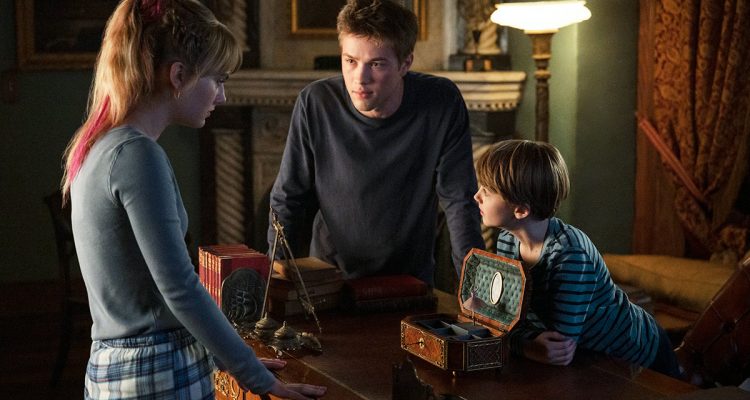Moving into a Victorian mansion after a violent death in your family—hey, it’s the next logical step of grief and the premise of countless horror films, no? But as a twist on this tradition, wouldn’t it be great if that creepy old house, seen in various films and TV series before, isn’t as scary as you would assume and instead, a gateway to something mysterious and fantastical? If that’s the pathway you’re hoping for, “Locke & Key” is the gatekeeper to such wonders. Unfortunately, the captivating mystery box set up of this new Netflix drama series doesn’t do much with the compelling set up, and is burdened with a deadbolt to further intrigue and satisfaction.
READ MORE: The 60 Most Anticipated TV Shows Of 2020
Despite a number of convoluted twists and turns, the story in “Locke & Key” is deceptively simple—a mom and her three kids move from Seattle to an old mansion in Massachusetts after the murder of her husband. Once there, the children hear enigmatic whispers, which lead them to discover the existence of various cryptic keys, each with their own unique supernatural ability. However, these hidden artifacts are tied to the family’s mysterious past and attract the attention of an inscrutable woman, who wants them for her own guarded reasons. If you haven’t guessed, secrecies are aplenty in “Locke & Key” and yes, the mysteries on top of mysteries create irritation from the pile-on of contrivances.
READ MORE: The 100 Best Films Of The Decade [2010s]
The fact that obscurities dominate “Locke & Key” shouldn’t be a surprise considering one of the series’ creators is none other than Carlton Cuse of “Lost” fame. And surprisingly, there is a lot of that “Lost” DNA in “Locke & Key” that makes it readily apparent that Cuse graduated from the JJ Abrams/Damon Lindelof School of Mystery Boxes.
READ MORE: The Best TV Shows & Mini-Series Of 2019
Where did the magical keys come from? Who is the woman out to collect them? Why was the kids’ father murdered? Why does their Uncle have amnesia? What’s up with the weird neighbor lady and her adopted son? And on, and on, and on. Each episode teases answers to some mysteries while introducing brand-new ones on top of it. Towards the middle of the 10-episode first season, you begin to wonder if anything is going to get resolved and if so, will it be worth the endless teasing? Unfortunately, it’s much like the rabbit hole mess of mysterious box gobbledygook that’s just further ambiguity and twists.
Spoilers aside, an episode of “Locke & Key” often goes like this: Kids find a key. The kids find out what the key does and do something fun/silly with their newfound power. The bad lady does something that you don’t understand but looks significant and foreboding. There are flashbacks to the dead dad, which illuminate a previously unknown, but important, detail about his past. The mom leaves the kids alone for an extended period of time as she goes off on her own adventure (hinting that she might take up drinking again, which is a terrible subplot and nearly sinks the show completely). Then the episode ends with a big reveal that simultaneously answers a question but asks four more. Throw in a couple of throwaway melodramatic high school scenes and rise and repeat, this formula soon grows tired and frustrating.
Before the blueprint crystalizes, the first three episodes are exciting and absorbing. But as the unremarkable, manufactured and formulaic story unfolds, it’s very easy to find your mind wandering, thinking about what you’d do with magical keys and how you’d be much better equipped to handle the Ghost Key than these brats. While the climax is excitable, it’s all a little too late by then. You know the narrative’s elusive withholding techniques means you won’t receive the answers you desire, and you’re conditioned to begin to look for the next twist. And sadly, you’ll start correctly guessing the revelations before they happen, removing all semblance of dramatic tension.
Worse, the characters in this repetitive and slight plot are thin and barely more than the archetypes that have populated typical YA franchises for years.
TV has evolved in the years since “Lost.” Viewers expect more than endless twists and turns aimed at keeping you watching, hoping that an answer is around the corner. But if you’re going to present a show like “Locke & Key” built around that sort of suspense, you better have a worthwhile payoff at the end. Sadly, “Locke & Key” is similar to the creepy old Key House, an old, outdated mansion filled with potentially fun mysteries and intrigue but lacking the strong bones and foundation that can sustain the structure for years to come. [C-]

